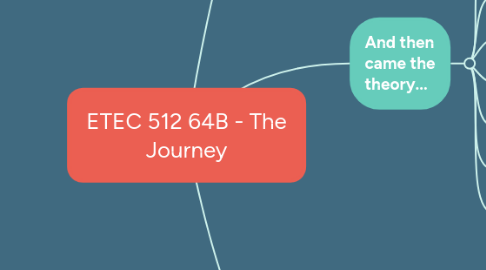
1. Where it all began...
1.1. Learning is dynamic.
1.2. Learning is experiential.
1.3. Learning is social (community).
1.4. Learning is hands-on.
1.5. Learning is asking questions.
1.6. Learning is exploration.
2. And then came the theory...
2.1. Behaviourism
2.1.1. Classroom Management
2.1.2. Reward systems
2.1.3. Consequences/Punishment
2.1.4. Responses to stimulus
2.1.5. Gamification
2.1.5.1. Achievements
2.1.5.2. Extrinsic Motivation
2.1.6. External (behaviour) vs. Internal (thinking)
2.1.7. Learning - Passive recipients of information
2.2. Cognitivism
2.2.1. Social Cognitive Theory
2.2.1.1. Bandura
2.2.1.2. Learning - social context
2.2.1.3. Observational learning
2.2.1.4. Vicarious reinforcement
2.2.2. Cognitive Information Processing
2.2.2.1. Think COMPUTER
2.2.2.2. Learner is the processor
2.2.2.3. Environmental information is input
2.2.2.4. Memory is storage
2.2.2.5. Output is learned capability
2.2.2.6. Brain operations
2.3. Neuroscience
2.3.1. Mapping neural functions of cognitive behaviours
2.3.1.1. Thinking
2.3.1.2. Remembering
2.3.2. Brain science
2.3.3. Metacognition
2.3.4. Learning is neural connections
2.3.5. Synapses can be strengthened - BRAIN WORKOUT
2.3.6. Social interaction increases cognitive processing
2.3.7. Gamification/Game-Based Learning
2.3.7.1. Neurochemical events
2.4. Piaget
2.4.1. 4 stages of cognitive development
2.4.1.1. Sensorimotor
2.4.1.2. Preoperational
2.4.1.3. Concrete Operational
2.4.1.4. Formal Operational
2.4.2. Schemas
2.4.3. Environmental interaction
2.4.4. Equilibrium
2.4.5. Disequilibrium
2.4.6. Physical Knowledge
2.4.7. Logico-mathematical knowledge
2.4.8. Social knowledge
2.5. Vygotsky
2.5.1. Social learning
2.5.2. Socio-cultural theory
2.5.3. ZPD
2.5.4. Scaffolding
2.5.5. Modelling
2.6. Constructivism
2.6.1. Construct knowledge
2.6.2. Environmental interactions
2.6.3. Deep learning
2.6.4. Hands-on learning
2.6.5. Experiential
2.6.6. Collaboration
2.6.7. Social Constructivism
2.6.8. Cognitive Constructivism
2.6.9. Past knowledge/experiences
2.7. Diversity in Learning
2.7.1. Diversity is diverse
2.7.2. UDL
2.7.3. Accomoations
2.7.4. Modifications
2.7.5. Technology
2.7.6. Access

